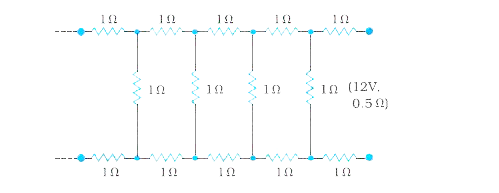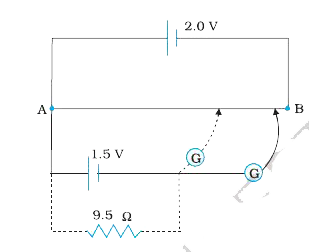Complete Solutions to ADDITIONAL EXERCISES of chapter CURRENT ELECTRICITY of Class 12 book with complete answers and questions
| Class 12 | PHYSICS |
| Chapter | CURRENT ELECTRICITY |
| NCERT GUJARATI | ADDITIONAL EXERCISES |
| Number Of Questions | 9 |
| Academic Year | 2023-24 |
The earth's surface has a negative surface charge density of `10^(-9)C m ^(-2).` The potential difference of 400 kV between the top of the atmosphere and the surface results (due to the low conductivity of the lower atmosphere) in a current of only 1800 A over the entire globe. If there were no mechanism of sustaining atmospheric electric field, how much time (roughly) would be required to neutralise the earth's surface? (This never happens in practice because there is a mechanism to replenish electric charges. namely tghe coontainual thunderstorms and lighting in different parts of the globe). (Radius of earth `=6.37 xx 10 ^(6) m.)`
View Solution(a) Six lead-acid type of secondary cells each of emf `2.0 V` and internal resistacne `0.015Omega` are joined in series to provide a supply to a resistance of `8.5 Omega.` What are the current drawn from the suply and its terminal voltage ?
(b) A secondary cell after long use has an emf of `1.9 V ` and a large internal resistance of `380 Omega.` What maximum current can be drawn from the cell? Could the cell drive tghe starting motor of a car ?
View SolutionTwo wires of equal length, one of aluminium an the other of copper have the same resistance. Which of the two wires is lighter ? Hence explain why aluminium wires are preferred for overhead power cables.
`(rho _(AI) =2.63 xx 10 ^(-8) Omega m, rho _(Cu) =1. 72 xx 10 ^(-8) Omega m.` Relative density of `Al =2. 7 of Cu =8.9.`)
View SolutionWhat conclusion can you draw from the follwing observation on a resistor made of alloy manganin ?

View SolutionAnswer the following questions:
(a) A steady current flows in a metallic conductor of non-uniform cross-section. Which of these quantities is constant along the conductor: current, current density electric field, drift speed ?
(b) Is Ohm's law universally applicable for all cnducting elements ? If not, give examples of elements which do not obey Ohm's law.
(c ) A low voltage suply from which one needs high currents must have very low internal resistance.Why
(d) A high tension (HT) supply of say, 6kV must have a very large internal resistance, Why ?
View SolutionChoose the correct alternative:
(a) Alloys of metals usually have (greater/less) resistivity than that of their constituent metals.
(b) Alloys usually have much (lower/higher) temperature coefficients of resistance than pure metals.
(c ) The resisitivity of the alloy manganin is nearly independent of/increases rapidly with increase of temperature.
(d) The resistivity of a typical insulator (e.g., amber) is greater than that of a metal by a factor of the order of `(10 ^(22) //10 ^(23)).`
View Solution(a) Given n resistores each of resistance R. how will you combine them to get the (i) maximum (ii) minimum effective resistance?
(b) Given the resistances of `1 Omega, 2 Omega, 3 Omega.` how will be combine them to get an equivalent resistance of `(i) (11//3) Omega (ii) (11//5) Omega, (iii) 6 Omega, (iv) (6//11) Omega` ?
(c ) Determine the equivalent resistance of networks shown in

View SolutionDetermine the furrent drawn from a 12 V suly with internal resistacne `0.5Omega ` by the infinite network shown in Each rsistor has `1Omega` resistance.

View Solutionshow a `2.0V` potentiometer used for the determination of internal resistance of a `1.5V` cell. The balance point of the cell in open circuit is `76.3` cm. When a resistor of `9.5Omega` is used in the external circuit of the cell, the balance point shifts to `64.8 cm` length of the potentiometer wire. Determine the internal resistance of the cell.

View Solution
ADDITIONAL EXERCISES questions and complete solutions for chapter CURRENT ELECTRICITY of NCERT PHYSICS(GUJRATI) of Class 12